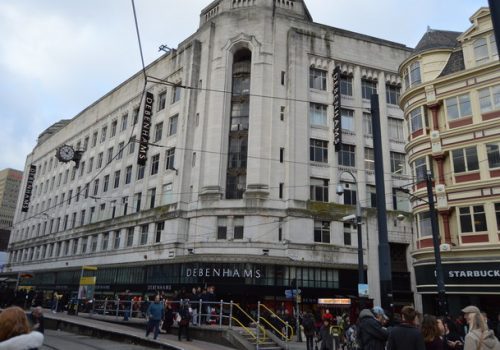Research pinpoints which Debenhams stores are likely to be axed

A property expert says business rates will play a major role in which Debenhams stores will face the axe.
And John Webber, head of business rates at property firm Colliers, claims stores in towns such as Stockport and Oldham are most at threat.
Debenhams announced it is closing 50 stores over the next five years and is considering the future of ten more after posting the worst financial results in its history.
The region’s biggest Debenhams stores are in Manchester’s Market Street and Liverpool One. There are also stores in Altrincham, Wigan and Bolton.
The closures will lead to the loss of 4,000 jobs but there has been no announcement in which stars will go.
The company announced a £491.5m statutory pre-tax loss -down from a £59m profit the previous year and underlying profit before tax more than halved, dropping 65.1% to £33.2m.
The chain is just one of a series to be hit by the dramatic downturn on the High Street in recent months.
The retailer has already announced it has called in KPMG restructuring specialists to help negotiate reduced rents for its sites and close unprofitable shops.
Business rates were not the only factor in Debenham’s swift decline – the store took a hit because of a £12.3m investment in the Debenhams Redesigned strategy and £512.4 m of exceptional write-downs.
However, John Webber, head of business rates at Colliers International, says local authority bills will be a major factor.
Research by Colliers into which stores they believe will be facing the axe, shows most of these are paying considerably more in business rates than they should be because of the effects of downward phasing of their rates bills, following the 2017 Rating Revaluation.
In Stockport, the Debenhams store saw a 33% reduction in its rateable value following the Revaluation.
But its rates bill only decreased 3% in the first year paying £330,000 instead of the £219,000 it should have been paying- an overpayment of 51%.
Colliers calculates that this will continue over the next four years of the rating list with Debenhams Stockport paying £359,000 in rates bills more than it should be.
Debenhams in Oldham which saw a 21% decrease in its rateable value, but in its first year paid a rates bill of £277,600 instead of the £196,400 it would have paid without downward transitional phasing.
This means over the next four years it will be paying £250,000 more in business rates than it should be.
“And these are only two examples.” continues Webber, “When you add up the bills across the country you can see what a massive impact downward phasing has and will have -and the impact on thousands of jobs too.”
Colliers analysed the rates bills of 46 of the hardest hit stores and found that over the next three years they will be paying £6.4 million in business rates than they should have been, had their rates bills been allowed to reach their true level immediately.
“On our rough calculation, that translates to around 1.28 million extra mascaras to sell ” says Webber.
He continued “It is no wonder Debenhams is looking at shutting up to 50 stores and is trying to reduce its rent bills or cut its store sizes in some areas. As business rates are tied to rental values, it would be mad not to.”







